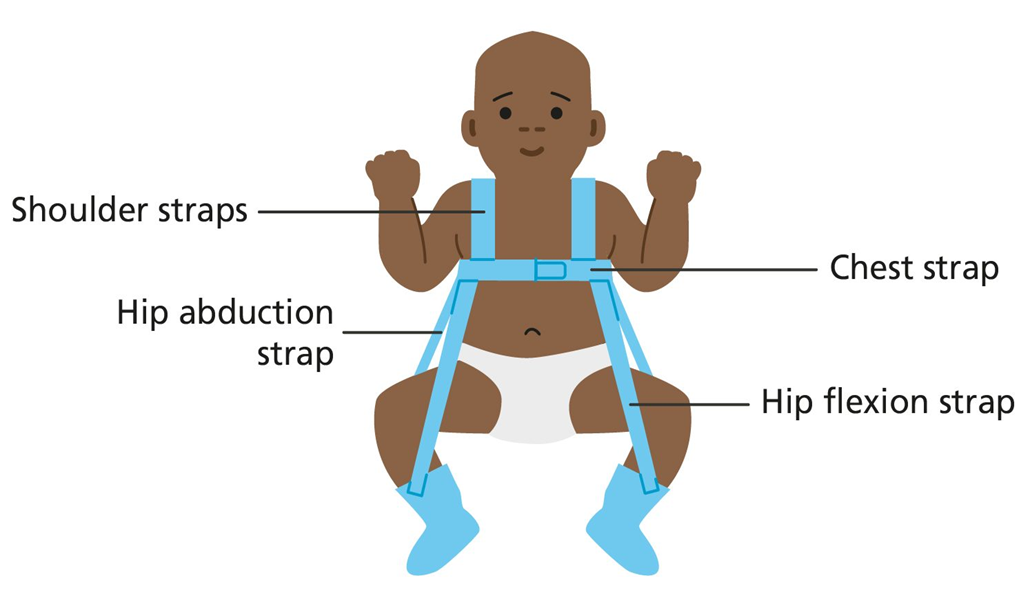The nurse is teaching a family how to care for their infant in a Pavlik harness to treat developmental dysplasia of the hip. Which instruction should be included in the teaching?
Remove harness several times a day to prevent contracture.
Place superabsorbent disposable diaper over the harness.
Return to the clinic every 12 weeks for adjustment of the harness.
Apply lotion or powder to minimize skin irritation.
The Correct Answer is B
Choice A reason:
Removing the harness several times a day is not recommended. The Pavlik harness should be worn continuously as prescribed by the doctor to ensure proper hip development. Removing it frequently can disrupt the treatment and may lead to complications.
Choice B Reason:
Placing a superabsorbent disposable diaper over the harness is important to keep the harness clean and dry. This helps prevent skin irritation and maintains hygiene. It is essential to ensure that the diaper is properly positioned to avoid any interference with the harness.

Choice C Reason:
Returning to the clinic every 12 weeks for adjustment of the harness is not accurate. Typically, follow-up visits are more frequent, especially in the initial stages of treatment. Regular adjustments are necessary to ensure the harness is fitting correctly and effectively promoting hip development.
Choice D Reason:
Applying lotion or powder to minimize skin irritation is not recommended. Lotions and powders can accumulate and cause further irritation or infection. Instead, keeping the skin clean and dry is the best way to prevent irritation while using the Pavlik harness.
Nursing Test Bank
Naxlex Comprehensive Predictor Exams
Related Questions
Correct Answer is D
Explanation
Choice A reason:
Infants do not outgrow clubfoot when they learn to walk. Clubfoot is a congenital deformity that requires medical intervention to correct. Without treatment, the condition can lead to significant disability and difficulty in walking1. The goal of treatment is to correct the foot’s position and function, allowing the child to walk normally.
Choice B reason:
Surgical intervention is not the first line of treatment for clubfoot. While surgery may be necessary in severe cases or if other treatments fail, the initial approach typically involves non-surgical methods. The Ponseti method, which includes serial casting and gentle manipulation, is the preferred initial treatment. Surgery is considered only if these methods do not achieve the desired results.
Choice C reason:
Traction with foot manipulation is not a standard treatment for clubfoot. The primary non-surgical treatment involves the Ponseti method, which includes serial casting and gentle manipulation of the foot3. This method has been shown to be highly effective in correcting clubfoot without the need for traction.
Choice D reason:
Frequent serial casting is the first line of treatment for clubfoot. The Ponseti method, which involves weekly casting and gentle manipulation of the foot, is the most widely used and effective treatment for clubfoot. This method gradually corrects the foot’s position over several weeks, followed by bracing to maintain the correction4. Serial casting is preferred because it is non-invasive and has a high success rate.
Correct Answer is D
Explanation
Choice A reason:
Marbles are not a safe play activity for a 3-year-old in a spica cast. Marbles are small and can pose a choking hazard. Additionally, playing with marbles requires fine motor skills and movement that may be restricted by the cast.
Choice B Reason:
Watching a movie is a safe activity but does not provide developmental benefits. While it can keep the child entertained, it does not engage the child in active play or promote cognitive and motor development.
Choice C Reason:
A game of checkers may be too advanced for a 3-year-old. It requires understanding of rules and strategic thinking, which may be beyond the developmental stage of a child this age. Additionally, it may not be engaging enough to hold the child’s attention.
Choice D Reason:
Playing with a toy telephone is an appropriate activity for a 3-year-old in a spica cast. It is safe and can be done while the child is in a stationary position. This activity encourages imaginative play and can help with language development and social skills.
Whether you are a student looking to ace your exams or a practicing nurse seeking to enhance your expertise , our nursing education contents will empower you with the confidence and competence to make a difference in the lives of patients and become a respected leader in the healthcare field.
Visit Naxlex, invest in your future and unlock endless possibilities with our unparalleled nursing education contents today
Report Wrong Answer on the Current Question
Do you disagree with the answer? If yes, what is your expected answer? Explain.
Kindly be descriptive with the issue you are facing.
